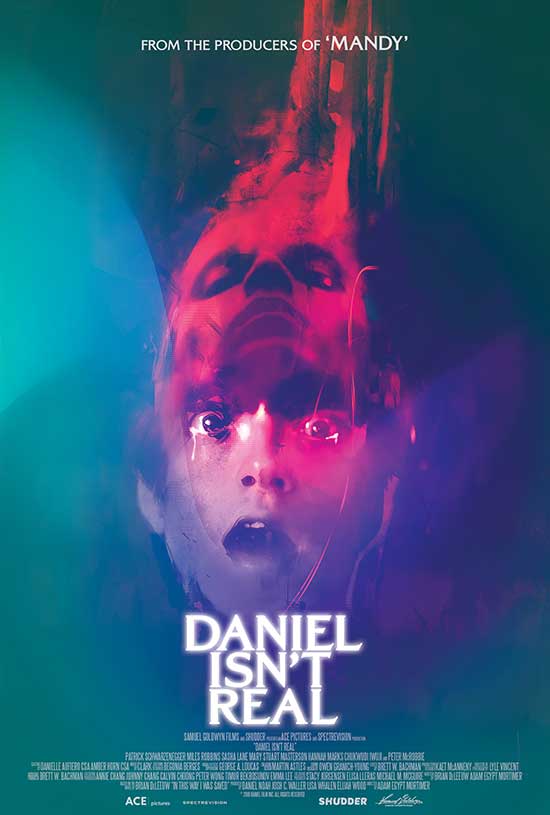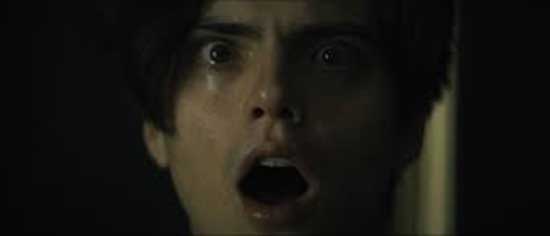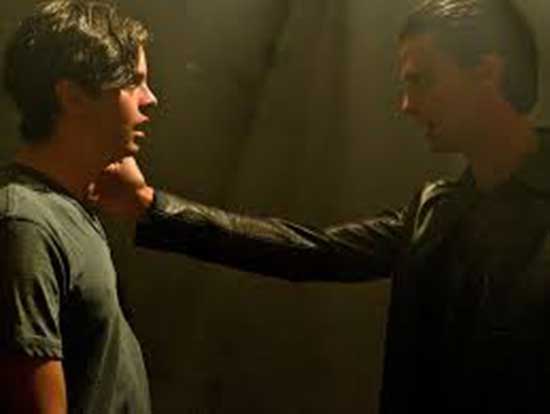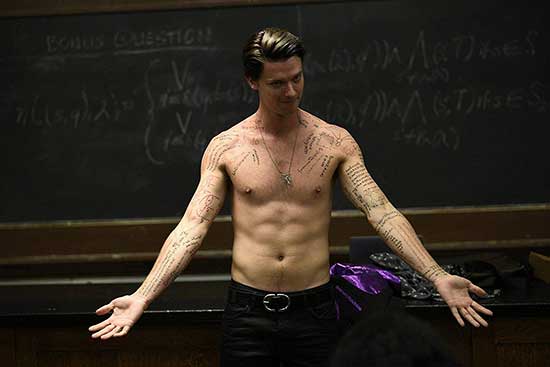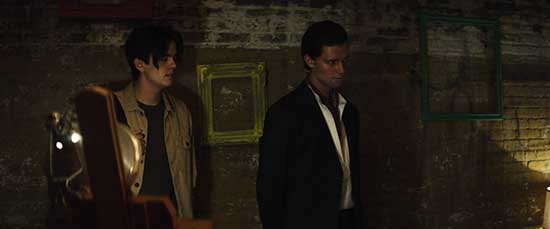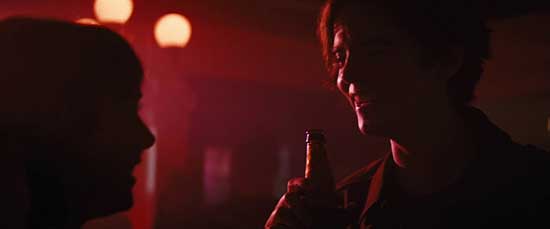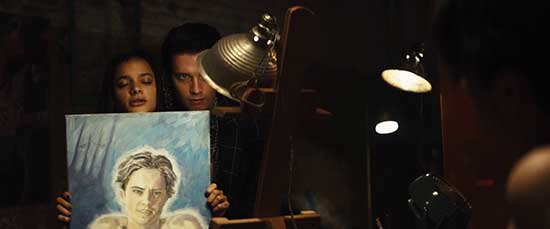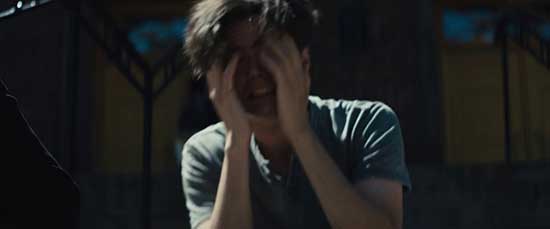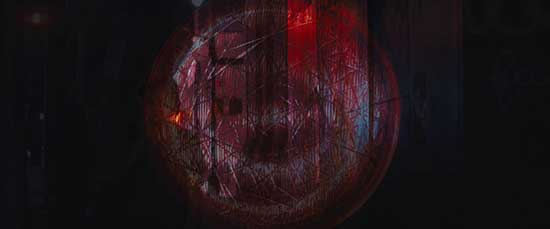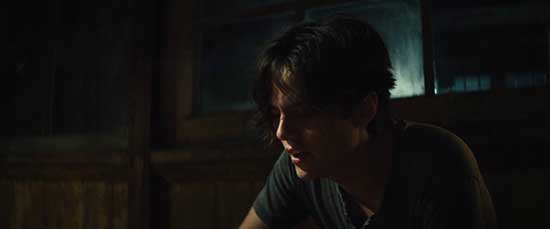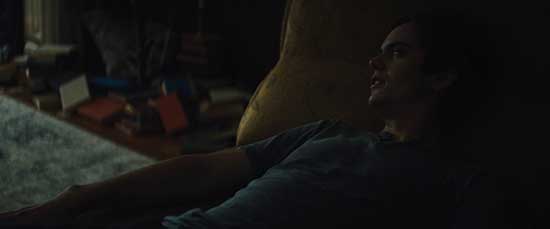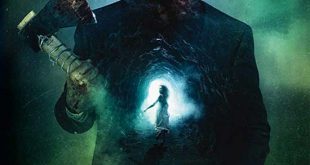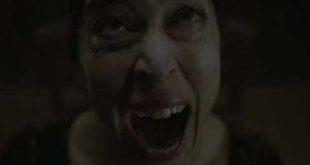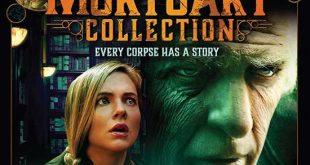SYNOPSIS:
A troubled college freshman, Luke, suffers a violent family trauma. He then resurrects his charismatic childhood imaginary friend Daniel to help him cope, not realizing how dangerous Daniel is.
REVIEW:
When you open your film with an apparent Hitchcock homage complete with Bernard Herrmann-inspired music, you are either attempting to evoke a mood or swaggering with some brass in your pants.
Not sure which Adam Egypt Mortimer had in mind as the film flips through images of a colorful vortex of cosmic energy, then a coffee shop where a young man rushes in and begins shooting people with a shotgun. As the barista screams, the scene shifts to a young boy, named Luke, watching his parents fight.
It seems the wife is under a doctor’s care but may be off her meds. This means little to the boy as he wanders outside. He pushes his way to the front of a crowd gathered at the coffee shop. In the doorway is the bullet-riddled body of the young shooter. Luke is visibly rocked by the brutal scene.
Before he can dwell on the dead body, another young boy appears next to him and invites him to play. He agrees, and they rush to the nearby park.
Meet Daniel. He becomes Luke’s best friend. They spend all day, every day, together. They play together, eat together, sleep together. Daniel has lots of ways to keep Luke from thinking about his parents divorce or that his mother is suffering from mental illness.
Oddly enough, no one can see Daniel except Luke. Everyone calls Daniel an “imaginary friend”. Daniel does not like being so easily dismissed.
One day, Daniel suggests a game. Give Mommy lots of the pills she takes. LOTS! He tells Luke the pills will give Mommy super powers. Luke hesitates, but he spikes the drink to keep from losing Daniel’s friendship.
After Mom nearly dies from the overdose, she makes Luke lock away his imaginary friend inside a doll house. Luke asks Daniel to get in the doll house. When his friend ignores him, he screams and berates Daniel until we see him inside the confines of the small toy home. Luke then locks the door, and his mother puts away the key.
Many years later, Luke returns home from college to find his mother’s condition has worsened. While his mother drifts further from reality, Luke experiences an incident that makes him question whether mental health issues are hereditary. Attempting to discover a cure for his growing problem, Luke decides to unlock the doll house and reconnect with Daniel.
“Daniel Isn’t Real” treads a fine line between being a straight-up examination of mental health in a family dynamic and being the tale of a very twisted cosmic entity with an agenda. Amazingly, the film works with both approaches.
As a purely psychological film, “Daniel” examines the connection of heredity and mental illness. Luke’s mother, played by Mary Stuart Masterson, is portrayed as a deeply disturbed person. Luke, unbalanced by his parents savage verbal fighting, is further traumatized upon seeing the bloodied body of the coffee shop shooter. He turns to self-comfort by way of Daniel, a manifestation of those thoughts, feelings, and urges that Luke has suppressed or does not understand.
Almost every step of Luke’s story could be linked to a progression of worsening mental health issues. Viewing the film from that angle, “Daniel Isn’t Real” creates a very depressing narrative that his disorders, like those of his mother, require more help than he is willing to accept or even understand. As can happen with unchecked mental illness, Luke’s life becomes an unsustainable series of nightmarish situations in which he acts out while “Daniel” manipulates him. Those around Luke can see the changes he is going through, but his illness prevents him from heeding their warnings.
The film also introduces the concept that Daniel’s troubles are not truly mental illness. It suggests that “Daniel” could be a cosmic entity that feeds on power and chaos, but the entity requires a host to stay in this world. What better disguise for possession than mental illness?
Either explanation, separate or together, drops the viewer into a world where nothing can be trusted and no safe harbor can be found – not family, not friends, not lovers, not even the supposed escape of sleep.
While a concept like this might be intriguing, the delivery is far more important. Director Adam Egypt Mortimer, who also co-wrote the script, confidently moves from the real world to Luke’s internal point of view, utilizing color techniques similar to Argento’s “Suspiria”. Tension and suspense ebb and flow as the viewer is drawn down the rabbit hole of Luke’s struggle for sanity. Other than some questionable nods to the rubber reality movies of the 80s and 90s that feel cheap and forced, the film keeps itself rooted in reality as much as possible.
Performances are excellent, though Patrick Schwarzenegger channeling Christian Bale’s uber slick Patrick Bateman from “American Psycho”, intentionally or not, dances on the edge of caricature, which comes close to breaking the carefully constructed tone of the film. The cast make the radical changes in characters’ emotional states feel organic.
“Daniel Isn’t Real” is a worthwhile selection if you want something smart, confident, and involving. You invest your time with it, so don’t expect it to be a parade of violence and gore to enjoy over pizza. This might make some critics best movie lists for the year, and it probably will deserve that recognition. While it may not be Oscar material, “Daniel Isn’t Real” is better made and more entertaining than 80 percent of the Video-On-Demand horror films you are likely to find.
 Horror News | HNN Official Site | Horror Movies,Trailers, Reviews
Horror News | HNN Official Site | Horror Movies,Trailers, Reviews
